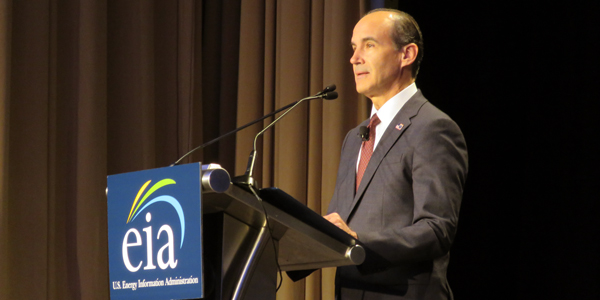The Senate Energy and Natural Resources Committee Tuesday approved Energy Under Secretary Mark Menezes’ nomination as deputy secretary.

Energy Under Secretary Mark Menezes | © RTO Insider
Menezes, a former utility lobbyist, was approved on a voice vote, with Nevada Democrat Catherine Cortez Masto casting the lone vote in opposition.
President Trump nominated Menezes to the Department of Energy’s Number 2 post to replace Dan Brouillette, who was named secretary after the resignation of Rick Perry in December.
At his confirmation hearing on May 20, Cortez Masto pressed Menezes to clarify comments he made during a House Energy Subcommittee hearing in February in which he indicated the Trump administration was pursuing Nevada’s Yucca Mountain as a permanent nuclear storage site. That contradicted the White House’s proposed 2021 fiscal budget, which included no money for development of the site, 100 miles northwest of Las Vegas.
“The president has been very clear on this. The administration will not be pursuing Yucca Mountain as a solution for nuclear waste,” Menezes testified, without explanation for his earlier remarks. “And I’m fully supportive of the president’s decision and I applaud him for taking action when so many others failed to do so.”
Cortez Masto opposed Yucca’s selection and is co-sponsor of the Nuclear Waste Informed Consent Act, which would ensure states, local governments and tribal communities have a voice in any nuclear waste siting process, including interim storage.
Menezes said the administration had not taken a position on the senator’s legislation. “However, we do know that the solution for nuclear storage will rest with Congress and we do pledge to work with you,” he said.
Testing Concerns
In a statement Tuesday, Cortez Masto said that while she “appreciated [Menezes’] clarification of the administration’s position that it will no longer pursue Yucca Mountain as the nation’s permanent nuclear waste disposal site,” she voted no because of recent reports suggesting the administration is considering resuming explosive nuclear testing.
The senator noted that Nevada was the site of more than 900 atmospheric and underground nuclear tests between 1945 and 1992, when the federal government developed a plan to ensure nuclear weapon readiness without explosive testing.
“Annually, the safety, reliability and effectiveness of the nation’s nuclear stockpile has been certified by the directors of the Los Alamos, Sandia and Lawrence Livermore National Laboratories, along with the secretaries of Defense and Energy,” she said. “Yet, reports are suggesting that this administration is prepared to jeopardize the health and safety of Nevadans, undercut our nation’s nuclear nonproliferation goals and further weaken strategic partnerships with our global allies just to flex its muscles on the global stage.
“There has been a changing tide in the administration on Yucca Mountain, and I believe Secretary Brouillette has played an important role in improving our communications with the department, but these recent events only suggest that the department still has work to do to earn back the trust of Nevadans,” said Cortez Masto.
Senate Floor Vote
Committee Chair Lisa Murkowski (R-Alaska) began the committee meeting by praising Menezes as “well qualified” for the deputy’s post, noting his prior work on Capitol Hill and his prior Senate confirmation. “I’m hopeful that Mr. Menezes will again draw strong bipartisan support and that we’ll be able to confirm him quickly once his nomination reaches the Senate floor,” she said.

The Senate Energy and Natural Resources Committee approved Mark Menezes’ nomination as deputy Energy secretary.
Confirmed as Under Secretary in 2017, Menezes previously worked in the Washington office of Berkshire Hathaway Energy. He also is a former partner at Hunton & Williams, where he headed the Regulated Markets and Energy Infrastructure practice group, and former chief counsel for energy and environment for the House Energy and Commerce Committee.
Before coming to Washington, he was a vice president with Central and South West. After its merger with American Electric Power, he was AEP’s associate general counsel for federal and state legislative and regulatory affairs.




